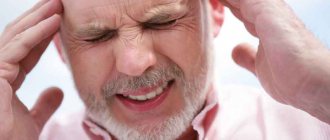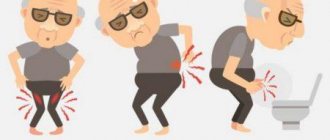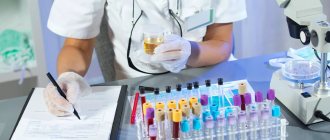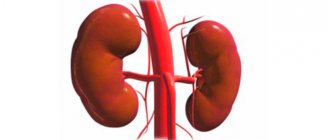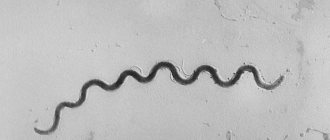Hypertension is a condition caused by impaired functioning of the heart and vascular system and causes serious disturbances in the functioning of important internal organs. An invariable sign of the disease is persistently increased blood pressure in the arteries. Other symptoms are often mild or absent altogether. The hidden clinical picture is the reason for late detection of pathology, which significantly complicates the treatment process. The choice of therapeutic measures depends on the stage of hypertension.
What is hypertension?
Hypertension is a disease whose main symptom is high blood pressure, the causes of which are considered to be a neurofunctional disorder of vascular tone. Most often, this disease occurs in people over 40, but recently hypertension has become noticeably younger and is diagnosed in people of different ages. Hypertension affects both men and women equally often. This disease is one of the main causes of death in people with diseases of the cardiovascular system.
For many decades, scientists from around the world have been studying arterial hypertension. According to research data, the results of which are published in specialized media, hypertension is the main cause of disability on our planet. Statistics indicate that arterial hypertension very often causes death in patients who seek help from a medical facility too late.
By the way
Today, they try to treat hypertension not with one medicine, but with a combination of several drugs, often placed in one tablet for convenience. This is more effective because drugs of different mechanisms of action are used, which allows them to be prescribed not in high, but in low or medium doses.
In recent years, new long-acting drugs have been used that reduce blood pressure for a whole day with a single daily dose. But the main thing is that these medications are prescribed by a doctor.
He must not only prescribe medications, but also explain the rules for taking them. Here are the most important :
- You cannot reduce blood pressure very quickly, in a short period of time. It is much safer to do this in 2-3 stages over several months.
- Once you feel an improvement, you should not stop taking the medications.
- It is dangerous to reduce the dosage of medications on your own. It is especially risky to reduce the dose of beta blockers on your own. This threatens a cardiac catastrophe - for example, a heart attack.
- A good antihypertensive drug does not necessarily have to give a quick effect.
Symptoms of hypertension
The main symptom of hypertension is headache, this occurs due to narrowing and spasm of blood vessels in the brain. Also common symptoms of hypertension are tinnitus, flying “flies” and blurred vision, general weakness, sleep disturbances, dizziness, a feeling of heaviness in the head, rapid heartbeat. The listed symptoms are observed at the early stage of hypertension and are neurotic in nature. At a later stage of hypertension, heart failure may occur due to constant overwork of the heart muscle due to high blood pressure.
Due to the progression of the disease process, there may be a decrease in visual acuity, damage to the blood vessels of the brain from high blood pressure, and this can lead to paralysis, decreased sensitivity of the limbs, which occurs due to vasospasm, hemorrhage or thrombosis.
In addition, many hypertensive patients experience the following symptoms:
- nosebleeds;
- vomit;
- loss of sleep;
- memory impairment;
- redness of the facial skin during any physical effort;
- strong pressure on the eyes (it hurts for patients to look around, so they prefer to rest and wait for the attack to subside in silence with their eyes closed);
- increased heart rate;
- swelling;
- fatigue, etc.
Pulmonary hypertension and hypertension: what is the difference
Many people think that pulmonary hypertension is hypertension. But that's not true. Pulmonary arterial hypertension (PAH), unlike hypertension, is a rare disease. Develops due to very high blood pressure in the arteries leading from the heart to the lungs. This causes excessive strain on the heart, which eventually causes the right half to stop. The increase in pulmonary hypertension is gradual, causes right ventricular heart failure and leads to death.
Causes of pulmonary hypertension:
- diseases of the heart and blood vessels of various origins;
- chronic pathologies of the respiratory system: tuberculosis or bronchial asthma;
- violation of metabolic processes;
- blockage of the pulmonary artery or its branches by blood clots;
- living in the highlands.
If the exact cause of pulmonary hypertension is not established, the disease is diagnosed as congenital.
The symptoms are very similar to those of many diseases, including the symptomatic picture of hypertension. But only a doctor can make a correct diagnosis, determine the causes of the disease and prevent the development of complications and death.
PAH is an incurable disease that cannot be cured. Most often it occurs in women 35-55 years old. But if pathology is detected at an early stage, it is possible to improve the patient’s quality of life. You should consult a doctor if you have the following symptoms:
- Shortness of breath at rest or after exercise.
- Constant cough for no reason.
- Chronic weakness.
- Increased heart rate.
- Swelling of the legs or ankles.
- Feeling of tightness or pain in the sternum.
- Fainting.
- Dizziness.
Causes of hypertension and risk factors
The cause of hypertension is frequent, prolonged neuropsychic stress, prolonged stressful situations. Often, a prerequisite for the occurrence of hypertension is work, during which a person is under constant emotional stress. People who have suffered a concussion are also more likely to develop hypertension. Hereditary predisposition can also be one of the causes of hypertension: if someone in your family suffered from this disease, then the likelihood of developing hypertension increases several times.
One of the main causes of hypertension may be physical inactivity. With age, as older people begin to develop atherosclerosis and age-related changes in blood vessels occur, the development of hypertension can worsen the problem, causing atherosclerosis to progress. This is a rather dangerous phenomenon, since with severe vasospasm, blood access to the brain, heart and kidneys becomes critically small. If plaques are present on the walls of blood vessels, then with severe vascular spasm, blood may completely stop flowing to vital organs and circulating through the arteries. In this case, myocardial infarction or stroke occurs.
In women, the cause of hypertension can be the period of hormonal changes in the body during menopause. Table salt, or more precisely, the sodium contained in it, as well as smoking, alcohol abuse and excess weight also contribute to increased stress on the cardiovascular system.
The causes of hypertension include the following factors:
- excess weight due to metabolic disorders, endocrine diseases, sedentary lifestyle, etc. (even minor deviations from the norm can cause problems with the heart and blood vessels, against the background of which arterial hypertension will develop);
- regular emotional stress, the patient being in stressful situations, depression, tragedies experienced, etc.;
- severe nervous tension caused by problems at work or in business;
- previous brain injuries (accidents, falls, bruises, hypothermia);
- chronic diseases that have a negative impact on the cardiovascular system (diabetes, gout, rheumatoid arthritis);
- hereditary predisposition (statistically, children whose parents suffered from arterial hypertension often inherit these problems and begin to observe the first symptoms of high blood pressure at a young age);
- viral and infectious diseases, the consequences of which can manifest themselves in the form of hypertension (meningitis, frontal sinusitis, sinusitis, etc.);
- age-related changes in blood vessels;
- increased levels of cholesterol in the blood, in which plaques form on the walls of blood vessels, interfering with normal blood circulation (spasms often occur in such vessels, which interfere with the flow of blood to vital organs and can provoke a stroke or heart attack);
- the menopausal state in which women who have overcome the 40-year mark are found (during significant hormonal changes in the body, latent diseases often begin to progress, against the background of which arterial hypertension can develop);
- bad habits (smoking, drinking alcohol in large quantities, excessive coffee drinking);
- daily consumption of salt in large quantities;
- a sharp increase in adrenaline in the blood;
- spending a long time at the computer;
- sedentary lifestyle;
- rare walks in the fresh air, etc.
On the subject: Hypertension 1, 2, 3 and 4 degrees
Psychological reasons
This type of internal reasons includes:
- neuroses of various origins;
- emotional instability;
- severe mental stress;
- stressful situations;
- depressive states;
- psychological trauma;
- emotional shock (shock).
Psychological problems are the most important factor leading to hypertension. What causes a person’s blood pressure to increase in this case? Tension in the nervous system, which is accompanied by strong emotions, hidden experiences, and constant stress, leads to the production of adrenaline. This hormone constricts blood vessels and increases blood pressure. If a person is constantly in a state of psychological conflict with himself or the world around him, hypertension becomes his faithful companion.
The collective image of a hypertensive person could contain the following features:
- He is too concerned with other people's opinions of himself.
- This is usually a workaholic.
- Likes to control everyone and everything, including himself.
- Unconfident.
- Doesn't trust anyone.
- Secretive, reserved, keeps everything to himself.
- Lives with a feeling of guilt.
- He is characterized by anger, touchiness, anger, irritability.
- Constantly strives to be ahead, craves self-affirmation, and is overly demanding of himself.
- Constantly waiting for a threat, a catch, always on the alert, in tense anticipation of trouble.
This is only an approximate portrait of a person suffering from high blood pressure; he may only have some of the listed traits. The main thing is that he urgently needs the help of a psychotherapist.
Immediate (direct) causes of increased blood pressure:
- Hardening of blood vessels, loss of elasticity of their walls.
- Increased viscosity (thickness) of blood.
- Thinning, fragility of blood vessels.
- Narrowing of the lumen of the vascular walls. It can be caused by the body's reaction to any irritants. Or the vessels may be narrowed in a calm state due to the presence of deposits of calcium salts, cholesterol plaques, and blood clots.
- Increasing blood volume.
All these reasons can be caused by one or more of the factors described above.
What are hypertensive crises?
Hypertensive crisis is the peak manifestation of hypertension. When blood pressure rises sharply, all of the above symptoms are observed, but nausea, vomiting, sweating and darkening of the eyes are added to them. Such crises can last from several minutes to several hours. Patients complain of a rapid heartbeat, they are excited and scared. In this condition, red spots may appear on the cheeks, and sometimes there may be excessive urination or loose stools during an attack. Hypertensive crises most often occur after severe emotional stress in women during menopause, in the afternoon or at night.
There is another type of hypertensive crisis, which has a more severe course, its development is gradual, and it is quite long in time - it can torment a person for four to five hours or even several days. Such a crisis most often occurs in the later stages of the development of hypertension, and, as a rule, this occurs against the background of chronically high blood pressure. A severe crisis is very often accompanied by cerebral symptoms - for example, speech impairment or loss of sensitivity in the limbs may occur. Sometimes such a crisis is accompanied by severe heart pain.
Video: Svetlana Pogoretskaya - chief physician, Ph.D. multidisciplinary center for preventive medicine, and cardiologist Olga Burunova talk about hypertension:
On the subject: First emergency aid for hypertensive crisis
Treatment of arterial hypertension
Non-drug treatment is prescribed to all patients with hypertension without exception, as it increases the effect of drug therapy and significantly reduces the need for antihypertensive drugs.
First of all, it is based on changing the lifestyle of a patient suffering from arterial hypertension. It is recommended to avoid:
- smoking, if the patient smokes;
- consumption of alcoholic beverages, or reducing their intake: for men up to 20-30 grams of ethanol per day, for women up to 10-20, respectively;
- increased consumption of table salt with food, it must be reduced to 5 grams per day, preferably less;
- using medications containing potassium, magnesium or calcium. They are often used to reduce high blood pressure.
On the topic: Magnesium is the most important mineral for hypertension!
In addition, the doctor will strongly recommend:
- for overweight patients, normalize body weight, for which it is sometimes better to consult a nutritionist to create a diet that allows you to eat a balanced diet;
- increase physical activity by exercising regularly;
- Introduce more fruits and vegetables into your nutritious diet while reducing your intake of foods rich in saturated fatty acids.
For “high” and “very high” risks of cardiovascular complications, the doctor will immediately begin using drug therapy. The specialist will take into account the indications, the presence and severity of contraindications, as well as the cost of the drugs when prescribing them.
As a rule, medications with a daily duration of action are used, which makes it possible to prescribe one or two doses. To avoid side effects, taking medications begins with a minimum dosage.
We list the main medications for hypertensive drugs:
There are six groups of hypertensive drugs that are currently used. Among them, beta-blockers and thiazide diuretics are the most effective.
Let us repeat, treatment with medications, in this case, thiazide diuretics, should be started with small doses. If no effect is observed, or the patient does not tolerate the drug well, minimal doses of beta-blockers are prescribed.
Thiazide diuretics are marketed as:
- first-line drugs for the treatment of hypertension;
- the optimal dose is the minimum effective.
Diuretics are prescribed for:
- heart failure;
- arterial hypertension in the elderly;
- diabetes mellitus;
- high coronary risk;
- systolic hypertension.
Taking diuretics is contraindicated in case of gout, and in some cases, during pregnancy.
Indications for the use of beta-blockers:
- combination of angina with hypertension and previous myocardial infarction;
- presence of increased coronary risk;
- tachyarrhythmia.
The drug is contraindicated in:
- bronchial asthma;
- obliterating vascular diseases;
- chronic obstructive pulmonary disease.
When treating hypertension with drugs, doctors use combinations of drugs, the prescription of which is considered rational. In addition, according to indications, the following may be prescribed:
- antithrombocidal therapy - for the prevention of stroke, MI and vascular death;
- taking lipid-lowering drugs in the presence of multiple risk factors;
- combination drug treatment. Prescribed in the absence of the effect expected from the use of monotherapy.
On the subject: Diet for hypertension: what can you eat and what can you not?
Diagnosis of hypertension
To make an accurate diagnosis of a patient who has shown signs of arterial hypertension, a specialist must carry out a set of diagnostic measures, including both laboratory and hardware examinations. The purpose of diagnosis is to determine the stage and degree of hypertension. Thanks to this data, the attending physician will be able to choose the most effective therapy.
Due to the fact that arterial hypertension at the first stage of its development is often asymptomatic, most patients arrive at a medical facility too late. In such cases, patients should be patient, since hypertension is very difficult to treat and can accompany a person for the rest of his life. In order not to lose precious time and receive timely medical care, you need to closely monitor your health and immediately respond to any alarm signals from the body.
At home, every person should regularly measure their blood pressure using a tonometer. The optimal values are 120/80; for older people, the acceptable value is 130/90. An increase in systolic pressure by 5-10 units can be caused by changes in climatic conditions, too much physical and mental stress. Too large a difference between the “upper” and “lower” pressure is also a cause for alarm - normally this figure should not exceed 50 units. If a person often observes surges in his blood pressure, he needs to urgently contact the nearest medical facility and get a detailed consultation with a highly specialized specialist.
How to get accurate results?
- Measure blood pressure indicators exclusively in a calm environment, sitting with a straight back, leaning on the back of a chair (in a relaxed state).
- Wear loose clothing.
- Take measurements no earlier than an hour after eating. You should also stop smoking and drinking coffee for 60 minutes.
- Don't talk.
- Before the procedure, you should lie down for at least 5 minutes.
- Measure blood pressure on both arms 2-3 times.
Taking these recommendations into account, you can obtain true data at home, without outside help. It is recommended to measure the pressure level at the slightest headaches, chest pressure and other symptoms, and if elevated levels are detected, immediately consult a doctor, because hypertension detected in the early stages allows you to eliminate the disease in full.
This approach to diagnosing latent hypertension will allow you to identify the disease yourself. Often the disease does not manifest itself during a medical examination, but at home it begins to actively progress, so checking your blood pressure level at home will allow you to notice the ailment in time, and if abnormal readings are detected that are much higher than normal, call emergency help.
Therefore, hypertension, like any disease, has symptoms and causes, but you should not wait for major disruptions in the functioning of the cardiovascular system, or serious urges for treatment (pain). This is fraught with the transition of the disease to complicated forms, leading to death. To protect yourself, it is recommended to purchase a tonometer and regularly measure pressure readings, and if there are frequent deviations, consult a doctor for emergency treatment.
Stages of hypertension
Modern medicine defines 3 stages of arterial hypertension:
- Stage 1 – blood pressure 140–159/90–99 mm Hg. Art. The pressure may return to normal levels from time to time, and then rise again;
- Stage 2 is blood pressure, which ranges from 160–179/100–109 mmHg. Art. Blood pressure is often abnormal and very rarely returns to normal levels;
- Stage 3 – when the pressure rises to 180 or higher/110 mmHg. Art. The pressure is almost constantly high, and its decrease may be a sign of a malfunction of the heart.
Stage 1 hypertension:
At the first stage of arterial hypertension, the patient may not feel significant changes in his body. Very often, the pressure, which due to certain reasons rises to 140/90 or 160/100, independently returns to normal levels (120/80).
It is possible to detect hypertension at the first stage only if the patient independently monitors his blood pressure. The drawn up schedule will allow the specialist to draw certain conclusions and make an accurate diagnosis.
Stage 2 hypertension:
At the second stage, arterial hypertension is often accompanied by headaches, nausea, lethargy, general weakness, etc.
In patients, blood pressure rises and remains for a long time in the range from 160/100 to 180/110. Blood pressure rarely returns to normal on its own, so patients need medication.
Stage 3 hypertension:
The third stage of arterial hypertension is considered the most dangerous, since in most patients with it the pressure can reach 180/110 or higher. An unexpected decrease in blood pressure at the 3rd stage of hypertension can be regarded by specialists as a sign of a malfunction of the heart and serve as a reason for consultation with a cardiologist. Patients begin to clearly manifest symptoms of hypertension, which forces people to seek help from medical institutions.
This category of patients requires long-term treatment (often in a hospital setting), which involves taking special medications and undergoing physiotherapeutic procedures.
With the disease arterial hypertension, many patients (especially at stages 2 and 3) may experience hypertensive crises, during which the pressure rapidly increases.
During such attacks, patients may experience the following symptoms:
- nausea and vomiting;
- heart pain;
- severe headaches;
- dizziness;
- increased sweating, etc.
A hypertensive crisis can end in a few minutes, or it can drag on for several hours. Such patients require emergency medical care.
On topic: 5 popular folk methods for hypertension
Hidden factors
Based on medical practice, many people live their usual lives and do not feel any signs of hypertension, and attribute temporary malaise and weakness to fatigue from a hard day at work. Most often, hypertension with hidden symptoms is discovered during a random therapeutic examination (when a doctor measures pressure with a tonometer), and at home (by the hypertensive patient himself). Then it becomes clear that the constant negative impact on the body cannot pass without leaving a trace. The patient has a question about how to identify hidden cardiovascular problems and how to eliminate them.
Both women and men can equally not feel attacks of high blood pressure. However, members of the stronger sex are more likely to die due to asymptomatic hypertension.
Having studied more than a dozen patients with asymptomatic hypertension, scientists have not yet been able to find the answer to why there is no pain from the disease, but the effect is the same? They are inclined to believe that the main causes of latent hypertension lie in the consumption of alcoholic beverages and regular exposure to stressful situations (accompanied by unfavorable emotions).
As a result, if a patient periodically experiences headaches, numbness in the left arm, vascular pulsation in the temporal zone, slight pressing or pain in the chest, rapid heartbeat, shortness of breath, then hypertension shows minimal signs.
Having discovered deviations in the performance of the vascular-cardiac system, you should regularly measure the pressure level at home using a tonometer (at least 5 times a day, even at night). If the device shows a pressure level of 140/90 or more, you should immediately call an ambulance, because the asymptomatic form is especially dangerous. Without causing severe pain, a person may not notice a significant increase in pressure (or be calm about the deviation), which will lead to unforeseen consequences, and even death.
If chronic hypertension is detected, you should regularly take medications strictly as prescribed by your doctor, do not skip doses or change dosages without his knowledge. Be examined by a cardiologist at least once every 6 months to clarify the prescription and avoid complications (myocardial infarction, atherosclerosis and hypertensive crisis).
How to treat hypertension?
When treating arterial hypertension, a specialist individually selects a course of drug therapy for each patient.
In most cases, the following medications are prescribed for hypertension:
- Thiazide diuretics are drugs that reduce fluid levels in the body and, accordingly, blood pressure;
- Sartans (angiotensin II receptor blockers) - modern drugs that have been used since the 90s, can reduce blood pressure for 24 hours after a single dose in the morning or evening;
- Calcium antagonists are prescribed if cardiac dysfunction, arrhythmia, angina pectoris or severe cerebral atherosclerosis are observed.
- Angiotensin-converting enzyme inhibitors - capable of dilating the cavity of blood vessels and arteries (these drugs prevent the development of vascular spasms and facilitate the work of the heart);
- Beta-blockers - normalize heart rate (with increased pressure, the heart begins to work at an accelerated rate);
- Alpha-adrenergic receptor blockers, which are capable of very gently dilating peripheral vessels.
See also: Medicines used for hypertensive crisis
During treatment, patients should lead a calm lifestyle, in which there is no stress or emotional overload. Patients need to spend more time in the fresh air; it is best to take long walks in the forest, in a park, or near a pond. It is imperative to follow a diet, since proper nutrition is the key to successful treatment of arterial hypertension.
On the subject: How to get rid of pressure once and for all?
Treatment of hypertension
The complex of therapeutic measures should work in the following directions:
- lifestyle correction for hypertensive patients;
- it is necessary to minimize risk factors for the development of hypertension as much as possible;
- optimization of blood pressure indicators;
- maintenance therapy of affected target organs;
- treatment of underlying diseases.
Therapeutic methods for hypertension can be preventive, medicinal and surgical.
Preventative measures include:
- dietary food (less salty, fatty, sweet, flour);
- moderate physical activity;
- reasonable work and rest schedule;
- a full night's sleep;
- elimination of stress factors;
- getting rid of bad habits;
- fight against excess weight.
Surgical methods are used in the treatment of a malignant form of the disease when life-threatening conditions arise.
Patient Reminder
What pressure is considered normal?
| Age | Systolic (upper) pressure | Diastolic (bottom) pressure |
| Up to 1 year | 85–100 | 35–45 |
| 1–2 years | 85–105 | 40–50 |
| 3–7 years | 86–110 | 55–63 |
| 8–16 years | 93–117 | 59–75 |
| 17–20 years old | 100–120 | 70–80 |
| over 21 years old | no higher than 140 | no higher than 90 |
